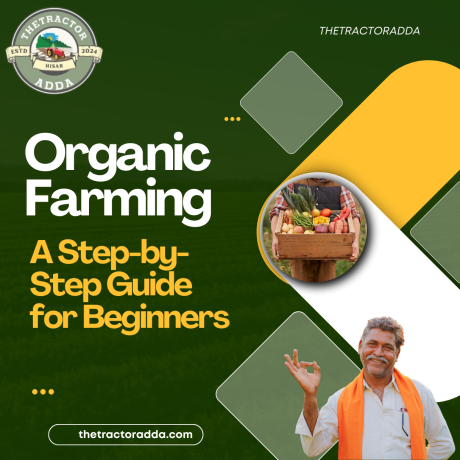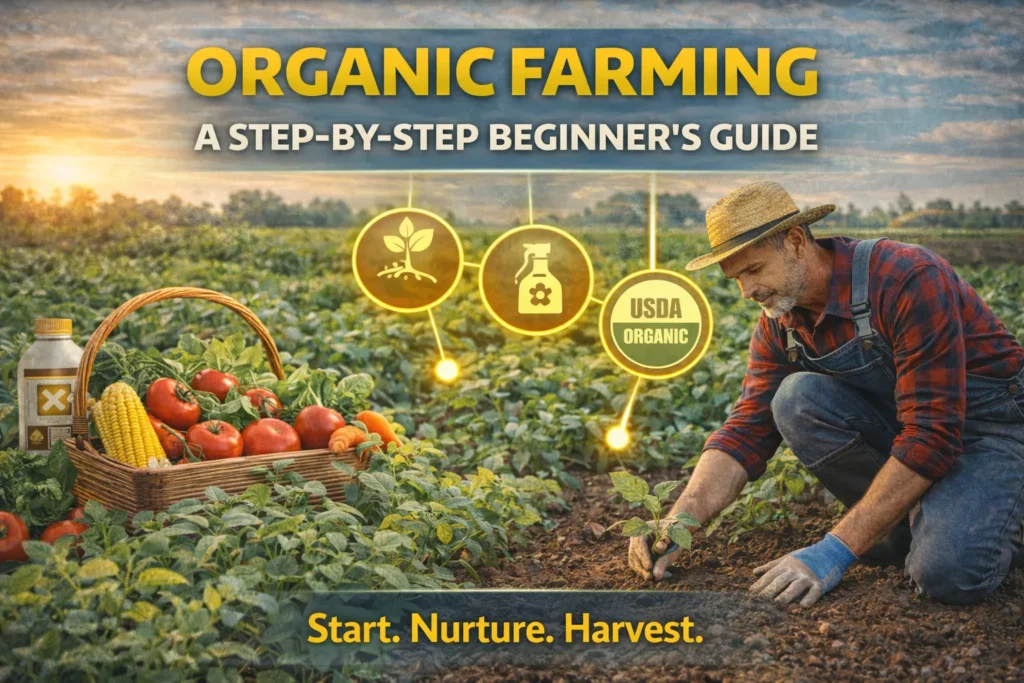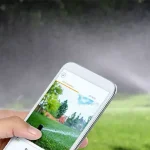Are you tired of food labels filled with words you can’t pronounce? Do you want to know exactly what goes into your food?
Organic farming might just be the answer you’re looking for. Imagine stepping outside and picking fresh, chemical-free vegetables straight from your garden. Sounds like a dream, right? This step-by-step beginner’s guide to organic farming is designed with you in mind.
Whether you’re looking to start a small backyard plot or dreaming of a larger farm, this guide will help you get your hands dirty and your garden thriving. We’ll walk you through the basics, from soil preparation to planting your first seeds, all with easy-to-follow steps that will have you growing your own organic produce in no time. Curious to see how you can transform your gardening space into a healthy, green oasis? Keep reading to discover the secrets of organic farming and how you can make it a rewarding part of your life.

Benefits Of Organic Farming
Organic farming enriches soil health, leading to more nutritious crops. It also reduces chemical usage, protecting the environment. This sustainable approach promotes biodiversity, supporting wildlife and healthier ecosystems.
Organic farming is not just a trend; it’s a lifestyle choice that reaps numerous benefits for both you and the planet. Whether you’re a seasoned gardener or a complete beginner, understanding these benefits can be a game-changer. Imagine savoring the taste of fresh veggies from your garden, knowing they are free from harmful chemicals. As you embark on this journey, you’ll discover how organic farming supports a healthier ecosystem and a more sustainable future.
Environmental Benefits
Organic farming is a friend to Mother Earth. By avoiding synthetic fertilizers and pesticides, it helps protect soil health and promotes biodiversity. Picture this: your garden becomes a haven for bees, butterflies, and earthworms. This thriving ecosystem not only supports plant growth but also aids in combating climate change.
Health Benefits
Growing your own organic produce means you control what goes into your food. You avoid the harmful residues found in conventionally grown crops. Imagine biting into a crisp apple, knowing it’s free from toxins. These cleaner, healthier options can have a positive impact on your well-being.
Economic Benefits
While organic farming might seem costly initially, it offers long-term savings. You reduce reliance on expensive chemical fertilizers and pesticides. Plus, selling surplus produce can supplement your income. Have you ever thought about turning your hobby into a small business?
Community Benefits
Organic farming can bring people together. Sharing tips and exchanging seeds with fellow gardeners fosters a sense of community. Hosting a local farmers’ market or a garden tour can create bonds and inspire others. How wonderful would it be to build connections over shared passions?
Educational Benefits
Engaging in organic farming is a hands-on learning experience. You gain knowledge about soil health, plant biology, and sustainable practices. This can be an excellent opportunity to involve your children, teaching them about nature and responsibility. Imagine the joy of watching your little ones marvel at a seed sprouting into a plant.
As you consider these benefits, ask yourself: what kind of world do you want to create for future generations? Organic farming offers a path that nurtures both the earth and your soul. Are you ready to take the first step?
Essential Tools And Supplies
Starting your journey in organic farming requires the right tools and supplies. These essentials make your work efficient and fruitful. They help you maintain a healthy and productive farm. Let’s explore the key items every beginner should have.
Essential Tools For Soil Preparation
Invest in a sturdy spade or shovel. It helps with digging and soil turning. A hand trowel is useful for smaller tasks. A garden fork breaks up tough soil and removes weeds. A rake levels the soil and removes debris. These tools prepare your soil for planting.
Watering Equipment
Consistent watering is crucial for plant growth. Use a garden hose with a spray nozzle. It provides control over water flow. Soaker hoses ensure even watering and reduce water waste. Consider a watering can for small areas or delicate plants. These tools keep your garden hydrated.
Tools For Plant Care And Maintenance
Pruning shears keep plants healthy and tidy. Use them to remove dead or overgrown branches. A hoe is essential for weed control. It helps maintain clear planting areas. Hand gloves protect your hands from cuts and blisters. These tools ensure your plants thrive.
Composting Supplies
Composting enriches your soil naturally. A compost bin or pile is necessary. Use a pitchfork to turn your compost regularly. A compost thermometer ensures your pile stays at optimal temperatures. These supplies create rich compost for your garden.
Pest Control Tools
Organic farming means natural pest control. Use row covers to protect crops from pests. Insect traps reduce pest populations. A spray bottle with natural repellents can deter pests. These tools help keep your garden pest-free.
Preparing Your Land
Preparing your land is crucial for successful organic farming. Start by clearing debris and testing soil quality. Ensure proper drainage to prevent waterlogging and promote healthy plant growth.
Preparing your land is the first critical step in starting your organic farming journey. It sets the stage for everything that follows. Proper preparation ensures your crops will have a healthy, fertile environment to grow. But how do you go about it? Let’s dive into the key steps.
Understanding Your Soil
Before planting anything, get to know your soil. Conduct a soil test to determine its pH level and nutrient content. This helps you understand what your soil needs to support healthy plant growth. A friend once discovered her soil was too acidic for tomatoes, so she adjusted it using lime. What surprises might your soil hold?
Clearing The Land
Clear your land of weeds, rocks, and debris. These can compete with your plants for nutrients. Use tools like a hoe or rake for smaller areas. For larger plots, consider renting machinery. Removing these obstacles gives your crops the best chance to thrive.
Planning Your Layout
How will you organize your garden? Consider crop rotation and companion planting. These methods can help control pests and improve soil health. Draw a map of your garden to visualize the layout. This planning phase can save you time and effort later.
Enriching The Soil
Once cleared, enrich your soil with organic matter like compost or manure. This boosts its nutrient content and improves its structure. In my first year of gardening, I added homemade compost, which transformed my sandy soil. What could a simple compost pile do for your garden?
Creating Beds And Paths
Decide on the size and shape of your planting beds. Raised beds can improve drainage and soil quality. Leave enough space between beds for pathways. This makes it easier to access plants without compacting the soil.
Watering System Setup
Think about how you will water your crops. Drip irrigation is efficient and conserves water. Consider your budget and the size of your garden. Setting up a good watering system now can save you headaches in the future.
Preparing your land with care and attention lays the foundation for a successful organic farm. What steps will you take to prepare your land for a fruitful harvest?

Planting And Maintenance Tips
Starting an organic farm can be exciting and rewarding. With the right tips, you can grow healthy crops. Planting and maintaining your farm are key steps. Let’s explore how to do this effectively.
Choosing The Right Seeds
Pick seeds suitable for your climate and soil type. Check seed packages for information. Organic seeds ensure healthier plants. They resist diseases and pests better.
Preparing The Soil
Healthy soil is the foundation of organic farming. Add compost to enrich the soil. Test the soil pH for balance. Adjust it if needed. This helps plants absorb nutrients better.
Planting Techniques
Follow spacing guidelines on seed packets. Proper spacing allows plants to grow well. Use tools like trowels for even planting. Water the seeds gently after planting.
Watering Strategies
Water plants early in the morning. This reduces evaporation. Use drip irrigation for consistent moisture. Avoid overwatering to prevent root rot.
Natural Pest Control
Use natural methods to manage pests. Introduce beneficial insects like ladybugs. Plant flowers that attract these insects. They keep harmful pests away.
Weed Management
Remove weeds regularly to reduce competition for nutrients. Use mulch to prevent weed growth. Mulch retains soil moisture and improves fertility.
Regular Monitoring
Inspect plants for signs of stress or disease. Early detection helps manage issues quickly. Adjust care methods based on plant health. Keep a farming journal for notes.

Conclusion
Organic farming offers a sustainable path for beginners. Simple steps lead to healthy produce. Start small. Focus on soil health and crop rotation. Stay consistent with natural pest control. Use compost to enrich your soil. Patience is key to success.
Learn from each season. Connect with fellow organic farmers for tips. Share your experiences and grow together. Organic farming supports the environment and provides fresh food. It’s rewarding and beneficial. Embrace the journey and enjoy the fruits of your labor.
Happy farming!



